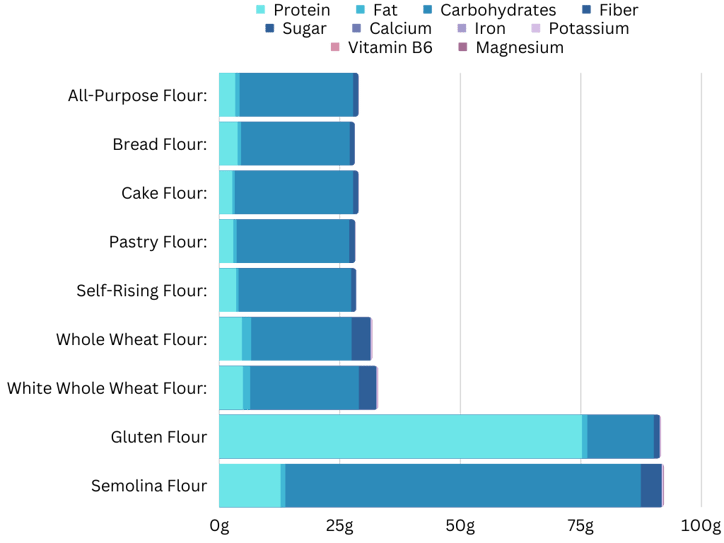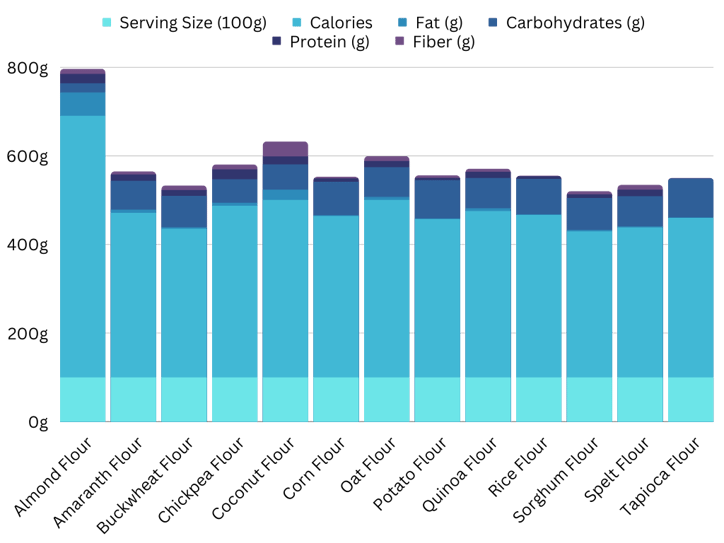
Flour is a staple ingredient in many baked goods, but not all flours are created equal. Here are some different types of flour, the nutritional information for each, and how to incorporate these flours into a healthy meal plan.
OnPoint Nutrition has helped more than 3,000 clients with unique health hurdles, and hundreds of them specifically with balancing nutrition and building a healthier relationship with food.
At OnPoint Nutrition, we understand that this can be a difficult and lengthy experience, but you are not alone. We have helped hundreds of clients with similar challenges to develop a healthier lifestyle.
In this article we will go over the different types of flours, best use and some of the nutritional benefits so that you can make the most informed choices for your best health.
Types of Fours
Flour is a finely-ground, sifted meal of grains, nuts, seeds, legumes or certain vegetables.
Finding the right flour can be essential for many reasons, especially for people with specific dietary needs or preferences. For instance, those with celiac disease or gluten intolerance must avoid wheat flour and other gluten-containing flours to avoid adverse health effects.
Additionally, some people may need to monitor their carbohydrate intake and choose flours with lower carbohydrate content, such as almond flour or coconut flour.
Furthermore, different flours have unique flavors and textures that may enhance the taste and quality of specific dishes. For example, chickpea flour may add a nutty flavor and dense texture to baked goods, while rice flour may create a lighter, fluffier texture.
Thus, finding the right flour can significantly impact the taste, texture, and nutritional value of various foods, making it an essential consideration for anyone looking to optimize their diet and health.
The following is a detailed description of the different types of flour and their nutrition profiles and cooking/baking qualities:
Wheat Flours
Wheat flours are the most prevalent and are traditionally milled. Refined wheat flours are enriched with thiamin, riboflavin, niacin and iron, and fortified with folic acid by law. Whole-wheat flours, which naturally contain B vitamins and iron, in addition to selenium, potassium and magnesium, are good sources of fiber. However, whole-wheat flours may not be enriched with folic acid.
The wheat flour category alone is extensive. Flours from "hard" wheat are ideal for bread making, as they are higher in protein (including gluten), which makes dough sticky, elastic and able to hold air bubbles formed by a leavening agent as the dough rises. Flours from "soft" wheat have less protein and less elastic quality, so they are better for delicate pastries and cakes.

1. All-purpose flour
This is a refined blend of high-gluten hard wheat and low-gluten soft wheat. It is milled with only the endosperm (not bran or germ) and is used for baking, thickening and breading. It is usually sold pre-sifted and is sometimes fortified with calcium and vitamins A or D.
All-Purpose Flour:
- Protein: 3.3g
- Fat: 0.9g
- Carbohydrates: 23.5g
- Fiber: 0.9g
- Sugar: 0.2g
- Calcium: 0.003g
- Iron: 0.0014g
- Potassium: 0.036g
- Vitamin B6: 0.00003g
- Magnesium: 0.004g
2. 100% whole-wheat flour
This is made from hulled red wheat grain (wheat berries). It provides more fiber and other nutrients and is used in place of all-purpose flour. It makes a heavier bread, and in baked goods, it is often mixed with all-purpose flour for a lighter texture and better rising. It has a shorter shelf life than all-purpose flour.
Whole Wheat Flour:
- Protein: 4.7g
- Fat: 1.9g
- Carbohydrates: 20.8g
- Fiber: 3.5g
- Sugar: 0.4g
- Calcium: 0.034g
- Iron: 0.0015g
- Potassium: 0.287g
- Vitamin B6: 0.00026g
- Magnesium: 0.054g
3. White whole-wheat flour
This is made from hulled white spring wheat. It can be used instead of regular whole-wheat flour in baked goods for a milder taste and light color.
White Whole Wheat Flour:
- Protein: 4.9g
- Fat: 1.5g
- Carbohydrates: 22.5g
- Fiber: 3.2g
- Sugar: 0.4g
- Calcium: 0.028g
- Iron: 0.0014g
- Potassium: 0.308g
- Vitamin B6: 0.0002g
- Magnesium: 0.054g
4. Self-rising flour
This is all-purpose flour with added salt and baking soda. It is a convenience product not generally used for yeast breads. The leavening action of baking soda can diminish if stored too long.
Self-Rising Flour:
- Protein: 3.5g
- Fat: 0.5g
- Carbohydrates: 23.3g
- Fiber: 0.8g
- Sugar: 0.2g
- Calcium: 0.004g
- Iron: 0.0012g
- Potassium: 0.036g
- Vitamin B6: 0.00004g
- Magnesium: 0.004g
5. Cake or pastry flour
This is a fine-textured refined flour made from soft wheat. It is high in starch and used for tender cakes and pastries.
Cake Flour:
- Protein: 2.7g
- Fat: 0.5g
- Carbohydrates: 24.5g
- Fiber: 0.5g
- Sugar: 0.6g
- Calcium: 0.003g
- Iron: 0.0008g
- Potassium: 0.028g
- Vitamin B6: 0.00003g
- Magnesium: 0.003g
Pastry Flour:
- Protein: 2.9g
- Fat: 0.7g
- Carbohydrates: 23.3g
- Fiber: 0.9g
- Sugar: 0.3g
- Calcium: 0.003g
- Iron: 0.0012g
- Potassium: 0.032g
- Vitamin B6: 0.00003g
- Magnesium: 0.005g
6. Bread flour
This is a refined flour made from hard wheat and a small amount of barley flour. It has very high gluten content and is used for bread making.
Bread Flour:
- Protein: 3.8g
- Fat: 0.7g
- Carbohydrates: 22.5g
- Fiber: 0.8g
- Sugar: 0.2g
- Calcium: 0.009g
- Iron: 0.0015g
- Potassium: 0.039g
- Vitamin B6: 0.00004g
- Magnesium: 0.007g
7. Gluten flour
This is a refined flour made from hard wheat with most starch removed. It has a significantly higher protein (gluten) content than all-purpose flour, which increases the strength and rising power of dough. It is blended with lower-gluten flours for bread.
Gluten Flour:
- Protein: 75.2g
- Fat: 1.1g
- Carbohydrates: 13.8g
- Fiber: 0.8g
- Sugar: 0.4g
- Calcium: 0.01g
- Iron: 0.007mg
- Potassium: 0.22g
- Vitamin B6: 0.002mg
- Magnesium: 0.032g
8. Semolina flour
This is generally coarsely-milled, refined hard durum wheat flour. It is used for pasta, couscous, gnocchi, and puddings. It is high in gluten. Coarsely-milled other wheat grains may also be called semolina, such as corn semolina (grits) and rice semolina.
Semolina Flour:
- Protein: 12.7g
- Fat: 1g
- Carbohydrates: 73.7g
- Fiber: 3.9g
- Sugar: 0.4g
- Calcium: 0.024g
- Iron: 0.004mg
- Potassium: 0.338g
- Vitamin B6: 0.16mg
- Magnesium: 0.138g
Non-Wheat Flours
Non-wheat flours are a great option for people who follow a gluten-free diet or for those who want to experiment with different flavors and textures.
These flours are usually made from grains, nuts, seeds, or legumes and offer a variety of uses and qualities.
Proper storage is essential to increase their shelf life since most of them are sold in pre-packaged quantities.

Chart: Serving size (100 grams), Common Non-Wheat Flour
Here are some popular non-wheat flours and how to use them:
1. Almond meal/flour
Made from blanched almonds, it is low in carbohydrates and high in protein. In ¼ cup, it contains 6g of protein, 3.5g of fiber, 60mg of calcium, 10 IU vitamin E (35% Daily Value), and 14g of fat, nearly all unsaturated. It adds moisture and nutty taste to pastries, baked goods, and dessert fillings. However, it is not meant to replace flour in yeast or quick breads. It has a short shelf life and should be refrigerated or frozen in airtight containers to retain its powdery quality.
Almond flour:
- Calories: 163 per 1/4 cup
- Fat: 14g
- Carbohydrates: 6g
- Fiber: 3g
- Protein: 6g
2. Chickpea Flour:
Made from ground chickpeas, this flour is high in protein and fiber. It's commonly used in Indian and Middle Eastern cuisine to make dishes like pakoras, socca, and falafel.
Chickpea flour:
- Calories: 356 per 1 cup
- Fat: 6g
- Carbohydrates: 53g
- Fiber: 10g
- Protein: 21g
3. Coconut Flour:
Made from ground coconut meat, this flour is high in fiber and low in carbs. It's commonly used in gluten-free baking, and can be used to make pancakes, cakes, and breads.
Coconut flour:
- Calories: 120 per 1/4 cup
- Fat: 4g
- Carbohydrates: 16g
- Fiber: 10g
- Protein: 4g
4. Buckwheat flour
Made from buckwheat, which is a cousin of rhubarb (not a wheat varietal nor technically a grain). It is usually combined with other flours to add a hearty, grassy flavor and color to bread. It is good for pasta and pancakes. Whole buckwheat flour has a stronger flavor and more nutrients, while white buckwheat is milder and has fewer nutrients.
Buckwheat flour:
- Calories: 92 per 1/4 cup
- Fat: 1g
- Carbohydrates: 20g
- Fiber: 3g
- Protein: 3g
5. Corn flour
Milled from the whole corn kernel (cornstarch is made from the endosperm). It is used in breading or blended with other flour for batter or dough. Note that cornmeal can be ground into corn flour in a food processor.
Cornmeal:
- Calories: 104 per 1/4 cup
- Fat: 1g
- Carbohydrates: 22g
- Fiber: 2g
- Protein: 2g
6. Hazelnut Flour:
Made from ground hazelnuts, this flour is high in healthy fats, protein, and vitamin E. It's great for gluten-free baking, and can be used to make cakes, cookies, and muffins.
Hazelnut flour:
- Calories: 170 per 1/4 cup
- Fat: 14g
- Carbohydrates: 8g
- Fiber: 4g
- Protein: 5g
7. Oat flour
Ground from oat groats, it is used to replace some flour in a variety of recipes. It adds a rich, nutty flavor and denser texture. In baked foods that need to rise, it must be combined with other flours.
Oat flour:
- Calories: 104 per 1/4 cup
- Fat: 2g
- Carbohydrates: 18g
- Fiber: 3g
- Protein: 4g
8. Sorghum Flour
Made from ground sorghum, this flour is high in protein and fiber. It has a slightly sweet flavor, and is commonly used in gluten-free baking.
- Calories: 120 per 1/4 cup
- Fat: 1g
- Carbohydrates: 25g
- Fiber: 3g
- Protein: 4g
9. Potato flour
Ground from whole, dried potatoes, it contains 2.5g of fiber and 400mg of potassium (12% DV) in ¼ cup. It is used as a thickener for smooth, creamy sauces, soups, gravies, and frozen desserts. For baking, it adds starch to the dough, which attracts and holds water and makes bread more moist, extending
Potato flour:
- Calories: 120 per 1/4 cup
- Fat: 0g
- Carbohydrates: 27g
- Fiber: 2g
- Protein: 2g
10. Brown & White rice flour
Made from unpolished brown rice, brown rice flour has a nutty flavor and a grittier texture than white rice flour. In 1/4 cup, brown rice flour contains 2g of fiber, compared to 1g in white rice flour. Brown rice flour is gluten-free and whole-grain, making it a great option for those with celiac disease or looking for a nutrient-dense alternative to white flour. It can be used like white flour in recipes, but may require additional liquid due to its denser texture. Try using brown rice flour in recipes like cornbread and pound cake for a nutty twist on classic baked goods.
Made from white rice, white rice flour is often used in baked goods like pie crusts and cookies. In shortbread, it gives a tender mouthfeel. Sweet or glutinous "sticky" rice flour is made from high-starch, short grain rice, which is used to thicken sauces in Asian dishes. Despite its name, glutinous rice flour does not contain gluten and is also gluten-free. It's a good option for those who are gluten intolerant or have celiac disease. While not as nutrient-dense as brown rice flour, white rice flour can be used as a substitute for wheat flour in many recipes.
Rice flour:
- Calories: 130 per 1/4 cup
- Fat: 0.5g
- Carbohydrates: 28g
- Fiber: 1g
- Protein: 2g
11. Tapioca flour
Made from cassava root, this flour is high in carbs and low in protein. It's commonly used as a thickener for soups and stews, and can also be used in gluten-free baking.
Tapioca flour:
- Calories: 100 per 1/4 cup
- Fat: 0g
- Carbohydrates: 26g
- Fiber: 0g
- Protein: 0g
12. Soy flour
Made from milled soybeans, soy flour is high in protein and lower in carbohydrates than all-purpose flour. In 1/4 cup, soy flour contains 10g of protein, 8g of total carbohydrate, and 3g of fiber. It is a good source of calcium and an excellent source of iron and magnesium. Soy flour can be used to thicken sauces and as a wheat flour substitute in quick breads and cookies, where 1 part soy flour can be substituted with 3 parts all-purpose flour. It also reduces fat absorption in frying batter or dough. Lightly toasting soy flour in a dry skillet over moderate heat can add a nutty flavor to baked goods.
Soy flour:
- Calories: 105 per 1/4 cup
- Fat: 1g
- Carbohydrates: 9g
- Fiber: 6g
- Protein: 13g
13. Spelt flour
Made from spelt, an ancient grain and cousin to wheat, spelt flour is slightly higher in protein and gluten than wheat flour. In 1/4 cup, spelt flour contains 4g of protein, 4g of fiber, and 1.5g of iron (8% DV). It has a mellow, nutty flavor and can be substituted for wheat flour in baking. However, it may cause reactions in those with wheat allergies. Both refined and whole spelt flour are available. Whole spelt flour is a whole-grain option that adds texture and flavor to baked goods.
Spelt flour:
- Calories: 120 per 1/4 cup
- Fat: 1g
- Carbohydrates: 24g
- Fiber: 4g
- Protein: 5g
Incorporating these flours into a thoughtful meal plan can provide a variety of nutrients while also catering to dietary needs. For example, using brown rice flour in a gluten-free recipe or incorporating soy flour into a high
How Can An Online Dietitian Help Me Choose the Right Flour For My Diet Plan?
A registered dietitian can play a crucial role in helping you choose the right flour for your dietary needs and meal plan. They can provide guidance on how to select flours that align with your specific health goals and dietary restrictions.
For example, if you have celiac disease or non-celiac gluten sensitivity, a dietitian can help you identify gluten-free flours that can be used as substitutes in your favorite recipes. They can also help you navigate the various flour alternatives that exist for those following a low-carbohydrate or low-FODMAP diet.
In addition, a dietitian can help you plan balanced meals that incorporate the right types and amounts of flours. They can provide education on the nutrient composition of different flours and help you make informed decisions about which flours to use for certain recipes or meals.
For instance, a dietitian can recommend using whole grain flours for increased fiber content and to slow the release of glucose into the bloodstream, which can help regulate blood sugar levels. This is beneficial to those battling prediabetes/diabetes.
The same biological concepts can be applied to many instances of health and it is always best to include a professional in a health plan when dealing with a chronic illness.
Overall, consulting with a registered dietitian can be an invaluable resource in helping you choose flours that align with your dietary needs and preferences while still providing the taste and texture you desire in your meals.
Taking the Next Steps
Choosing the right ingredients to build a healthy nutrition plan can be a daunting task, especially when it comes to flour types. At OnPoint Nutrition, we understand the importance of a nutritious and personalized meal plan, and that's why we offer the support of our team of expert dietitians.
Our registered dietitians will educate and guide you on choosing the right flour types that fit your dietary needs and meal plan. We recognize that there are numerous options available in the market, and it can be overwhelming to determine the best choice.
We take a personalized approach to develop a consistent and sustainable plan for success in cultivating a meal plan that satisfies and nourishes your body. This approach will cultivate a healthy and balanced relationship with food, allowing you to build a meal plan that is both nutritious and satisfying.
We keep up-to-date with the latest research and adjust our approach based on validated medical investigations, ensuring that you receive the most effective and personalized guidance.
Our online team of registered dietitians and Nutritionists is available to support you on your journey towards a healthier and more fulfilling life. With the help of our team , you can gain the knowledge and tools needed to make informed choices about your nutrition.
Empower yourself to achieve better health with OnPoint Nutrition.
Contact us to start building a healthier meal plan today!

With a knack for turning complex nutrition facts into engaging, relatable content, she’s on a mission to make healthy living fun and accessible. Backed by a stellar team of Dietitians and Nutritionists, Abby breathes life into OnPoint’s mission, inspiring others to embrace the transformative power of good nutrition. Her infectious enthusiasm and innovative approach make her a driving force in the journey towards better health for all.



